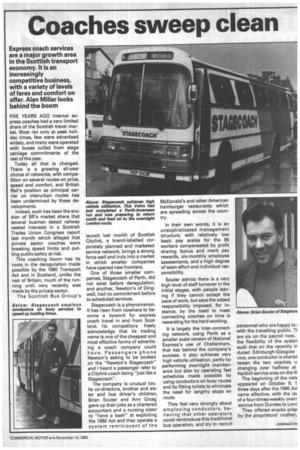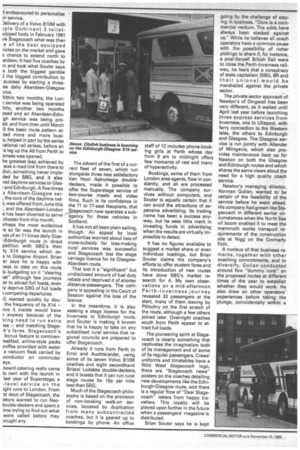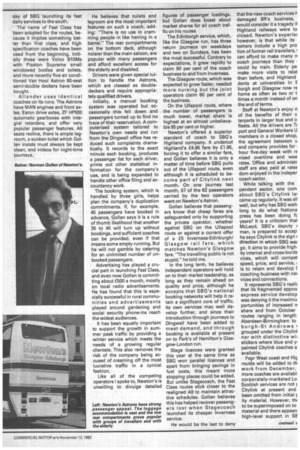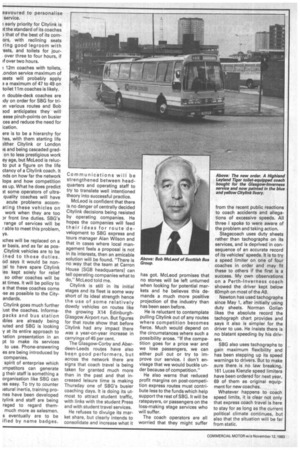Coaches sweep clean
Page 27

Page 28

Page 29

Page 30

If you've noticed an error in this article please click here to report it so we can fix it.
FIVE YEARS AGO internal express coaches had a very limited share of the Scottish travel market. Most ran only at peak holiday times, few were advertised widely, arid many were operated with buses culled from stage carriage commitments of the rest of the year.
Today all that is changed. There is a growing all-year choice of networks, with competition on several routes on price, speed and comfort, and British Rail's position as principal carrier on interurban routes has been undermined by these developments.
Indeed, such has been the erosion of BR's market share that several busmen detect railway vested interests in a Scottish Trades Union Congress report last month which alleged that private sector coaches were breaking speed limits and putting public safety at risk.
This coaching boom has its roots in the deregulation made possible by the 1980 Transport Act and in Scotland, unlike the rest of Britain, much of the running until very recently was made by the private sector.
The Scottish Bus Group's launch last month of Scottish Citylink, a brand-labelled corporately planned and marketed service network, brings a strong force well and truly into a market in which smaller companies have opened new frontiers.
One of those smaller companies, Stagecoach of Perth, did not exist before deregulation, and another, Newton's of Dingwall, had no commitment before to scheduled services.
Stagecoach is a phenomenon. It has risen from nowhere to become a byword for express coach travel in and from Scotland. Its competitors freely acknowledge that its trading name is one of the cheapest and most effective forms of advertising a coach company could have. Passengers phone Newton's asking to be booked on the "Newton's Stagecoach" and I heard a passenger refer to a Cityl ink coach being "just like a Stagecoach".
The company is unusual too. its co-directors, brother and sister and bus driver's children, Brian Souter and Ann Gloag gave up their jobs as a chartered accountant and a nursing sister to "have a bash" at exploiting the 1980 Act and they operate a system reminiscent of the In their own words, it is an unsophisticated management structure, with relatively low basic pay scales for the 85 workers compensated by profit sharing bonus and merit pay rewards, six-monthly employee assessments, and a high degree of team effort and individual responsibility.
Souter admits there is a very high level of staff turnover in the initial stages, with people leaving if they cannot accept the pace of work, but says the added responsibility imposed, for instance, by the need to meet connecting coaches on time is rewarding for the hard working.
It is largely the inter-connecting network, using Perth as a smaller scale version of National Express's use of Cheltenham, that lies behind the company's success. It also achieves very high vehicle utilisation, partly by performing overnight maintenance but also by operating fast schedules made possible by using conductors on busy routes and by fitting toilets to eliminate the need for lengthy stops en route.
They feel very strongly about employing conductors, believing that other operators could reintroduce this traditional bus operation, and try to recruit personnel who are happy to I with the travelling public. T1 are six on the payroll now, the flexibility of the systen such that on the recently in duced Edinburgh-Glasgow vice, one conductor is shared tween the two coaches u changing over halfway at Harthill service area on the W The beginning of the netv appeared on October 9, 1 three days after the '1980 Ad came effective, with the lei of a four-times-weekly overr service from Dundee to Lonc They offered snacks prep by the proprietors' mother, endeavoured to personalise ir service.
)elivery of a Volvo BlOM with iple Dominant 3 toiletJipped body in February 1981 re Stagecoach what was then e of the best equipped licles on the market and gave 3 chance to extend north to erdeen. It had five coaches by in and took what Souter says s both the biggest gamble I the biggest contribution to success by starting a threees daily Aberdeen-Glasgow vice.
Vithin two months, the Lon-1 service was being operated htly, another two months psed and an Aberdeen-Edin.gh service was being prod, and from then until March 3 the basic route pattern at:ted more and more busis, helped in part by the series iational rail strikes, before an -a leg up the A9 from Perth to ?.rness was opened.
he greatest leap achieved by was a road link from there to don, something never impleited by SBG, and it also red daytime services to Gies' and Edinburgh. A five-times y Aberdeen-Glasgow ser, the core of the daytime netk, was offered from June this , and the Aberdeen-London e has been diverted to serve chester from this month.
)rhaps the most audacious ee so far was the launch in ust of an 11-times daily Glas'-Edinburgh route in direct petition with SBG's then ly X14 service which exs to Glasgow Airport. Brian er says he is happy with -less to date on this route is budgeting on it "clearing ;et" although few journeys iar to attract full loads, even :y deprive SBG of full loads 3 competing departures.
G reacted quickly by douthe frequency of its X14 — ave it insists would have ?. anyway because of the ving need to run extra ies — and matching Stageh's fares. Stagecoach's bonus feature is continen-eakfast, airline-style packs coffee provided with water a vacuum flask carried by conductor on commuter eys.
.board catering really came ts own with the launch in last year of Superstage, a -level service on the ight runs to London. From -St days of Stagecoach, the ietors wanted to run Neolouble-deckers and spent a ime trying to find out what were called before they aought any.
The advent of the first of a current fleet of seven, which run alongside three less satisfactory Van Hool Astromega doubledeckers, made it possible to offer the Superstage service of two-course meals and video films. Such is its confidence in the 71 to 77-seat Neoplans, that tagecoach now operates a subagency for these vehicles in Scotland.
It has not all been plain sailing, though. An appeal by local authorities worried about loss of cross-subsidy for loss-making rural services was successful and Stagecoach lost the stage carriage licence for its GlasgowAberdeen route.
That lost it a "significant" but undisclosed amount of fuel duty rebate and deprived it of shorter distance-passengers. The company is appealing in the Court of Session against the loss of the licence.
In the meantime, it is also seeking a stage licence for the Inverness to Edinburgh route, and Souter is making it known that he is happy to take on any subsidised rural service that regional councils are prepared to offer Stagecoach.
Already it runs from Perth to Errol and Auchterarder, using some of its seven Volvo B1OM coaches and eight secondhand Bristol Lodekka double-deckers, and it boasts that it can run rural stage routes for 15p per mile less than SBG.
Much of the Stagecoach philosophy is based on the provision of non-booking walk-on services, boosted by duplication from many subcontracted coaches, but it is geared up to bookings by phone. An office staff of 12 includes phone-booking girls at Perth whose day from 8 am to midnight offers few moments of rest and many of hyperactivity.
Bookings, some of them from London area agents, flow in constantly, and all are processed manually. The company survives without computers, and Souter is equally certain that it can avoid the attractions of expensive advertising. Its trading name has been a success anyway, but he sees little merit in investing funds in advertising when the results are virtually impossible to detect.
It has no figures available to suggest a market share or even individual loadings, but Brian Souter claims the company's efforts to offer student fares and its introduction of new routes have done SBG's market research for it. My own observations on a mid-afternoon Perth-Inverness journey revealed 33 passengers at the start, many of them leaving by Pitlochry on the first stretch of the route, although a few others joined later. Overnight coaches south from Perth appear to attract full loads.
The pioneering spirit at Stagecoach is clearly something that captivates the imagination both of its management and of some of its regular passengers. Crews' uniforms and timetables have a Wild West Stagecoach logo, there are "Stagecoach news" posters on the coaches detailing new developments like the Edinburgh-Glasgow route, and there is a regular flow of "Dear Stagecoach" letters from happy travellers. This loyalty will be played upon further in the future when a passengers' magazine is distributed.
Brian Souter says he is kept going by the challenge of staying in business, "Ours is a commercial venture. The odds have always been stacked against us." While he believes all coach operators have a common cause with the possibility of richer pickings to share if, for instance, a post-Serpell British Rail were to close the Perth-Inverness railway, he fears that a conspiracy of state capitalism (SBG, BR and their unions) would be marshalled against the private sector.
The private sector approach of Newton's of Dingwall has been very different, as it waited until April last year before launching three express services from Inverness, one to Ullapool, with ferry connection to the Western Isles, the others to Edinburgh and Glasgow. The Glasgow service is run jointly with Allender of Milngavie, which also provides maintenance back up for Newton on both the Glasgow and Edinburgh routes and which shares the same views about the need for a high quality coach service.
Newton's managing director, Norman Gollan, wanted to be certain of the feasibility of the service before he went ahead. His company had grown like Stagecoach in different earlier circumstances when the North Sea oil boom enabled it to meet the mammoth works transport requirements of the construction site at Nigg on the Cromarty Firth.
A nucleus of that business remains, together with other coaching commitments, and to diversify, Gollan conducted around five "dummy runs" on the proposed routes at different times of the year to establish whether they would work. He also drew on other operators' experiences before taking the plunge, coincidentally within a day of SBG launching its fast daily services to the south.
The name of Fast Class has been adopted for the routes, because it implies something better than first class, and high specification coaches have been used from the beginning. Initially these were Volvo B10Ms with Plaxton Supreme small windowed bodies and toilets, and more recently five air conditioned Van Hool Astron 60-seat semi-double deckers have been bought.
Allender uses identical coaches on its runs. The Astrons have MAN engines and front axles, Eaton drive axles, ZF HP500 automatic gearboxes with integral retarders, and offer very popular passenger features. All seats recline, there is ample legroom, a sunken toilet which GotIan insists must always be kept clean, and videos for night-time journeys. He believes that toilets and legroom are the most important features on such a coach, adding: "There is no use in cramming people in like herring in a barrel." The rear compartments on the bottom deck, although noisier than the main saloon, are popular with many passengers and afford excellent access for the elderly and disabled.
Drivers were given special tuition to handle the Astrons, which are classed as doubledeckers and require appropriately qualified drivers.
Initially, a manual booking system was operated but occasionally this fell down and passengers turned up to find no trace of their reservation. A computerised system tailored to Newton's own needs and run from the Dingwall office has reduced such complaints dramatically. It records to the exact minute each booking, produces a passenger list for each driver, prints out other statistical information for the company's use, and is being expanded to handle other office filing and accountancy work.
The booking system, which is handled by three girls, helps plan the company's duplication commitments. If, for example, 45 passengers have booked in advance, Gollan says it is a rule of thumb likelihood that another 35 to 45 will turn up without bookings, and sufficient coaches can be provided, even if that means some empty running. But he will not gamble by catering for an unlimited number of unbooked passengers.
Advertising has played a crucial part in launching Fast Class, and even now Gollan is committing about £500 a month, mostly on local radio advertisements. He has found that this is especially successful in rural communities and advertisements played around gardening and social security phone-ins reach the widest audiences.
It has been equally important to support the growth in summer peak traffic by providing a winter service which meets the needs of a growing regular clientele. This also removes the risk of the company being accused of creaming off the most lucrative traffic in a cynical fashion.
Like all of the competing operators I spoke to, Newton's is unwilling to divulge detailed figures of passenger loadings, but Gollan does boast about market shares for all coach traffic on his routes.
The Edinburgh service, which, like the Glasgow run, has three return journeys on weekdays and two on Sundays, has been the most successful. Contrary to expectations, it grew rapidly to claim 80 per cent of the coach business to and from Inverness.
The Glasgow route, which was expected to grow faster, needed more nursing but the joint operators claim 60 per cent of the business.
On the Ullapool route, where the number of passengers is much lower, market share is highest at an almost unbelievable 95 per cent or higher.
Newton's offered a superior standard of coach to SBG's Highland company. It undercut Highland's £4.95 fare by £1.95, forcing it to offer a similar fare, and Gollan believes it is only a matter of time before SBG pulls out of the Ullapool route, even although it is scheduled to become part of Citylink next month. On one journey last month, 57 of the 62 passengers carried by the two operators went on Newton's Astron.
Gollan believes that passengers know that cheap fares are safeguarded only by supporting the private operator, whether against SBG on the Ullapool route or against a current offer of a £5 Inverness-Edinburgh/ Glasgow rail fare, which matches Newton's Glasgow fare. "The travelling public is not stupid," he told me.
In the long term, he believes independent operators will hold on to their market leadership, as long as they remain ahead on quality and price, although he accepts that SBG's national booking networks will help it retain a significant core of traffic. Its own services may well develop further, and since their introduction through journeys to Dingwall have been added to meet demand, and through booking is available at present on to Park's of Hamilton's Glasgow-London run, Stage licences were granted this year at the same time as SBG won parallel licences and apart from bringing savings in fuel costs, this meant more stopping places could be added. But unlike Stagecoach, the Fast Class routes stick closer to the realigned A9 to maintain attractive schedules. Gollan believes this has helped recover passengers lost when Stagecoach launched its cheaper Inverness service. that the new coach services h damaged BR's business, would consider it a tragedy if Highland railways were to closed. Newton's experier however, is that while its tomers include a high pro tion of former rail travellers, can afford to make many n coach journeys than they could by train. Elderly pe make more visits to relat than before, and Highland dents at universities in E burgh and Glasgow now re home as often as two or t times a month instead of on the and of terms.
Staff at Newton's enjoy n of the benefits of their c terparts in larger bus and ci fleets. All the drivers are Ti port and General Workers U members in a closed shop, the agreement between u and company provides for hour five-day week with rs nised overtime and wee rates. Office and administr staff are also paid at rates dom enjoyed in the indeper coach sector.
While talking with the pendent sector, one corn about SBG's Citylink lai came up regularly. It was all well, but why has SBG wait long to do what Nationa press has been doing fc years? It is a criticism that McLeod, SBG's deputy r man, is prepared to accep. he says Citylink is the sign r direction in which SBG war go. It aims to provide highity internal and cross-borde vices, which will compel speed, price, and service, is to retain and develop f. coaching business with neN vices and connections.
It represents SBG's realir that its fragmented appro.2 express service develop was denying it the maximu portunities of increased n share and from October routes ranging in length Aberdeen-Birmingham to burgh-St Andrews s grouped under the Citylinl ner with distinctive wii stickers where blue and y, painted Citylink coaches a available.
Folir West coast and Hig routes will be added to th work from December, more coaches are availabl corporately-marketed Lo Scottish services are not r Citylink at present and been omitted from initial r ity material. However, thr to be superimposed on to material and there appean high-level support in SB eavoured to personalise service.
early priority for Citylink is the standard of its coaches ) that of the best of its cornors, with reclining seats ring good legroom with .ests, and toilets for jourover three to four hours, if if over two hours.
12m coaches with toilets, .ondon service maximum of ;eats will probably apply a a maximum of 47 to 49 on toilet 11rn coaches is likely.
n double-deck coaches are idy on order for SBG for trim various routes and Bob aod anticipates they will ease pinch-points on busier ces and reduce the need for ication.
ere is to be a hierarchy for hes, with them starting life aither Citylink or London is and being cascaded gradon to less prestigious work ey age, but McLeod is relucto put a figure on the life ctancy of a Citylink coach, It nds on how far the network lops and how competition es up. What he does predict 3t some operators of ultraquality coaches will have acute problems accomating these vehicles on work when they are too )r. front line duties. SBG's range of services will be r able to meet this problem, vs.
iches will be replaced on a ar basis, and as far as posCitylink vehicles are to be ined to those duties. od says it would be non:al to have spare Citylink les kept solely for relief so other coaches will be at times. It will be policy to e that these coaches come ,se as possible to the Cityandards.
Citylink goes much further ust the coaches. Informapacks and bus station ibles are already being Kited and SBG is looking y at its entire approach to -iation presentation in an Pt to make its services to use. Phone-answering es are being introduced by companies.
spirit of enterprise which )mpetitors can generate g their staff is something a organisation like SBG can iss easy. To try to counter iatural inertia, training prones have been developed tylink and staff are being raged to regard themmuch more as salesmen. s eventually are to be ified by name badges. Communications will be strengthened between headquarters and operating staff to try to translate well intentioned theory into successful practice.
McLeod is confident that there is no danger of centrally decided Citylink decisions being resisted by operating companies. He hopes the companies will feed their ideas for route development to SBG express and tours manager Alan Wilson and that in cases where local management feels a proposal is not in its interests, then an amicable solution will be found. "There is no way that the team at Carron House [SGB headquarters] can tell operating companies what to do," McLeod told me.
Citylink is still in its initial stages and its fleet is some way short of its ideal strength hence the use of some relatively dowdy vehicles on routes like the growing X14 EdinburghGlasgow Airport run. But figures for that route show that before Citylink had any impact there as a year-on-year increase in carryings of 45 per cent.
The Glasgow-Corby and Aberdeen-Leeds routes have also been good performers, but across the network there are signs that coach travel is being taken for granted much more than in the past and that increased leisure time is making Thursday one of SBG's busier coaching days, It is doing its utmost to attract student traffic, with links with the student Press and with student travel services.
He refuses to divulge its market share, but clearly intends to consolidate and increase what it has got. McLeod promises that no stones will be left unturned when looking for potential markets and he believes this demands a much more positive projection of the industry than has been seen before.
He is reluctant to contemplate pulling Citylink out of any routes where competition becomes fierce. Much would depend on the circumstances where such a possibility arose. "If the competition goes for a price war and we lose passengers, we can either pull out or try to improve our service. I don't envisage that we would buckle under because of competition."
He also warns that reduced profit margins on post-competition express routes must contribute less to the funds which help support the rest of SBG. It will be ratepayers, or passengers on the loss-making stage services who will suffer.
The coach operators are all worried that they might suffer from the recent public reactions to coach accidents and allegations of excessive speeds. All three I spoke to were aware of the problem and taking action.
Stagecoach uses duty sheets rather than tachographs on its services, and is deprived in con sequence of an accurate record of its vehicles' speeds. It is to try a speed limiter on one of four coaches in order and may fit these to others if the first is a success. My own observations on a Perth-Inverness coach showed the driver kept below 60mph on most of the A9.
Newton has used tachographs since May 1, after initially using duty sheets. Norman Gollan likes the absolute record the tachograph chart provides and says it also is simpler for the driver to use. He insists there is no blatant speeding by his driv ers.
SBG also uses tachographs to gain maximum flexibility and has been stepping up its speed warnings to drivers. But to make sure there is no law breaking, 161 Lucas Kienzle speed limiters have been ordered for next year, 69 of them as original equipment for new coaches.
Whatever happens to coach speed limits, it is clear not only that express coach travel is here to stay for as long as the current political climate continues, but also that the situation will be far from static.








































































































































































